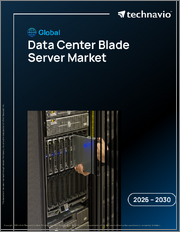
|
시장보고서
상품코드
1575171
ARM 기반 서버 시장 규모, 점유율 및 동향 분석 보고서 : 코어 유형별, OS별, 프로세서별, 용도별, 산업별, 지역별, 부문별 예측(2024-2030년)ARM-Based Servers Market Size, Share, & Trends Analysis Report By Core Type (ARM Cortex-A Core, ARM Cortex-M Core), By OS, By Processor, By Application, By Vertical, By Region, And Segment Forecasts, 2024 - 2030 |
||||||
ARM 기반 서버 시장 규모와 동향 :
ARM 기반 서버 세계 시장 규모는 2023년 58억 4,000만 달러로 추정되며, 2024년부터 2030년까지 연평균 14.3% 성장할 것으로 예상됩니다.
사물인터넷(IoT) 시장의 급격한 성장과 엣지 컴퓨팅 장치에 대한 수요 증가로 ARM 기반 서버에 대한 수요가 급증하고 있으며, ARM 프로세서는 확장성, 유연성 및 에너지 효율성이 뛰어나 IoT 용도에 적합합니다. ARM 프로세서는 에너지 효율과 낮은 전력 소비로 유명하며, 이는 서버에 매우 중요합니다. 특히 데이터센터 및 클라우드 환경에서 에너지 효율적인 컴퓨팅 솔루션에 대한 수요가 증가함에 따라 ARM 기반 서버의 채택이 증가하고 있습니다.
클라우드 컴퓨팅의 급격한 성장과 하이퍼스케일 데이터센터의 채택 증가도 ARM 기반 서버 시장의 주요 동인이며, 아마존 웹 서비스(AWS)와 마이크로소프트 애저(Microsoft Azure)와 같은 클라우드 서비스 제공업체들은 온디맨드 컴퓨팅 리소스에 대한 수요 증가에 대응하기 위해 지속적으로 인프라를 확장하고 있습니다. ARM 기반 서버는 이러한 클라우드 서비스 제공업체들이 방대한 양의 데이터를 관리하고 대규모 워크로드를 효율적으로 지원할 수 있는 확장성과 비용 효율성이 뛰어난 솔루션으로, 온디맨드 컴퓨팅 리소스에 대한 수요 증가에 대응하기 위해 지속적으로 인프라를 확장하고 있습니다. 효율적으로 지원할 수 있습니다.
주요 클라우드 제공업체의 요구를 지원하도록 설계된 하이퍼스케일 데이터센터는 ARM 프로세서의 모듈식 아키텍처와 확장성 덕분에 ARM 서버는 병렬 및 분산 컴퓨팅 작업을 효율적으로 처리할 수 있어 데이터 분석, AI, 머신러닝, 컨텐츠 전송 네트워크(CDN) 워크로드에 적합합니다. 데이터 분석, AI, 머신러닝, 컨텐츠 전송 네트워크(CDN) 등의 워크로드에 적합합니다. 이러한 추세는 컨테이너와 마이크로서비스의 사용 확대에 따라 더욱 가속화되고 있으며, ARM 기반 서버는 에너지 효율적이고 확장 가능한 설계로 인해 이러한 처리에 적합합니다.
기업과 정부가 지속가능성을 우선시하는 가운데, 그린 컴퓨팅과 데이터센터의 탄소배출량 감소에 대한 관심이 높아지고 있습니다. 에너지 효율이 높은 아키텍처를 갖춘 ARM 기반 서버는 이러한 추세를 뒷받침하기에 적합합니다. 데이터센터는 막대한 전력을 소비하지만, 전 세계적으로 온실 가스 배출량 감축이 추진되면서 친환경 컴퓨팅 솔루션 도입에 대한 관심이 높아지고 있습니다. 성능 목표를 달성하고, 전력 및 냉각 관련 운영 비용을 절감하며, 지속가능성 목표를 달성할 수 있습니다.
목차
제1장 조사 방법과 범위
제2장 주요 요약
제3장 ARM 기반 서버 변수, 동향, 범위
- 시장 서론/계통 전망
- 업계 밸류체인 분석
- 시장 역학
- 시장 성장 촉진요인 분석
- 시장 성장 억제요인 분석
- 업계 기회
- 서비스 분석 툴
- Porter의 Five Forces 분석
- PESTEL 분석
제4장 ARM 기반 서버 : 코어 유형 추정·동향 분석
- 부문 대시보드
- ARM 기반 서버 : 코어 유형 변동 분석, 2023년 및 2030년
- ARM Cortex-A 코어 기반 서버
- 시장 규모 추정과 예측, 2018년-2030년
- ARM Cortex-M 코어 기반 서버
- 시장 규모 추정과 예측, 2018년-2030년
제5장 ARM 기반 서버 : OS 추정·동향 분석
- 부문 대시보드
- ARM 기반 서버 : OS변동 분석, 2023년 및 2030년
- Android
- 시장 규모 추정과 예측, 2018년-2030년
- iOS
- 시장 규모 추정과 예측, 2018년-2030년
- Windows
- 시장 규모 추정과 예측, 2018년-2030년
제6장 ARM 기반 서버 : 프로세서 추정·동향 분석
- 부문 대시보드
- ARM 기반 서버 : 프로세서 변동 분석, 2023년 및 2030년
- 32비트 운영체제 ARM 기반 서버
- 시장 규모 추정과 예측, 2018년-2030년
- 64비트 운영체제 ARM 기반 서버
- 시장 규모 추정과 예측, 2018년-2030년
제7장 ARM 기반 서버 : 용도 추정·동향 분석
- 부문 대시보드
- ARM 기반 서버 : 변동 분석, 2023년 및 2030년
- 모바일 컴퓨팅
- 시장 규모 추정과 예측, 2018년-2030년
- 3D 그래픽
- 시장 규모 추정과 예측, 2018년-2030년
- 사물인터넷(IoT)
- 시장 규모 추정과 예측, 2018년-2030년
- 스마트홈
- 시장 규모 추정과 예측, 2018년-2030년
- 웨어러블
- 시장 규모 추정과 예측, 2018년-2030년
- 센서
- 시장 규모 추정과 예측, 2018년-2030년
- 기업 및 인프라 네트워킹
- 시장 규모 추정과 예측, 2018년-2030년
- 무선통신
- 시장 규모 추정과 예측, 2018년-2030년
제8장 ARM 기반 서버 : 업계 추정·동향 분석
- 부문 대시보드
- ARM 기반 서버 업계별 2023년과 2030년
- 자동차
- 시장 규모 추정과 예측, 2018년-2030년
- 헬스케어
- 시장 규모 추정과 예측, 2018년-2030년
- 통신
- 시장 규모 추정과 예측, 2018년-2030년
- 석유 및 가스 시추
- 시장 규모 추정과 예측, 2018년-2030년
- 바이오사이언스
- 시장 규모 추정과 예측, 2018년-2030년
- 산업 자동화
- 시장 규모 추정과 예측, 2018년-2030년
- 기타
- 시장 규모 추정과 예측, 2018년-2030년
제9장 ARM 기반 서버 시장 : 지역 추정·동향 분석
- ARM 기반 서버 시장 점유율, 지역별, 2023년 및 2030년
- 북미
- 코어 유형별, 2018년-2030년
- OS별, 2018년-2030년
- 프로세서별, 2018년-2030년
- 용도별, 2018년-2030년
- 업계별, 2018년-2030년
- 미국
- 캐나다
- 멕시코
- 유럽
- 코어 유형별, 2018년-2030년
- OS별, 2018년-2030년
- 프로세서별, 2018년-2030년
- 용도별, 2018년-2030년
- 업계별, 2018년-2030년
- 영국
- 독일
- 프랑스
- 아시아태평양
- 코어 유형별, 2018년-2030년
- 프로세서별, 2018년-2030년
- 용도별, 2018년-2030년
- 업계별, 2018년-2030년
- 중국
- 인도
- 일본
- 호주
- 한국
- 라틴아메리카
- 코어 유형별, 2018년-2030년
- OS별, 2018년-2030년
- 프로세서별, 2018년-2030년
- 용도별, 2018년-2030년
- 업계별, 2018년-2030년
- 브라질
- 중동 및 아프리카
- 코어 유형별, 2018년-2030년
- OS별, 2018년-2030년
- 프로세서별, 2018년-2030년
- 용도별, 2018년-2030년
- 업계별, 2018년-2030년
- 아랍에미리트(UAE)
- 사우디아라비아
- 남아프리카공화국
제10장 경쟁 구도
- 주요 시장 진출기업의 최근 동향과 영향 분석
- 기업 분류
- 기업의 시장 점유율 분석
- 기업 히트맵 분석
- 전략 매핑
- 확대
- 인수합병(M&A)
- 파트너십과 협업
- 신제품 발매
- 연구개발
- 기업 개요
- Advanced Micro Devices, Inc
- Ampere Computing LLC
- ARM Limited
- Cloud Software Group, Inc.
- Huawei Technologies Co., Ltd.
- Linaro Limited
- Marvell
- Red Hat, Inc.
- SUSE
- Texas Instruments Incorporated
ARM-Based Servers Market Size & Trends:
The global ARM-based servers market size was estimated at USD 5.84 billion in 2023 and is anticipated to grow at a CAGR of 14.3% from 2024 to 2030. The rapid expansion of the Internet of Things (IoT) market and the growing need for edge computing devices fuel the demand for ARM-based servers. ARM processors are well-suited for IoT applications due to their scalability, flexibility, and energy efficiency. ARM processors are known for their energy efficiency and low power consumption, which is critical for servers. The growing demand for energy-efficient computing solutions, especially in data centers and cloud environments, is driving the adoption of ARM-based servers.
The rapid growth of cloud computing and the increasing adoption of hyperscale data centers are also key drivers of the ARM-based server market. Cloud service providers, such as Amazon Web Services (AWS) and Microsoft Azure, continually expand their infrastructure to meet the rising demand for on-demand computing resources. ARM-based servers offer a scalable and cost-effective solution for these providers, enabling them to manage vast amounts of data and support large-scale workloads efficiently.
Hyperscale data centers, designed to support major cloud providers' needs, benefit from ARM processors' modular architecture and scalability. ARM servers can handle parallel processing and distributed computing tasks efficiently, making them ideal for workloads like data analytics, AI, machine learning, and content delivery networks (CDNs). This trend is further accelerated by the growing use of containers and microservices, which ARM-based servers are well-suited to handle due to their energy-efficient, scalable design.
As businesses and governments prioritize sustainability, there is a growing focus on green computing and reducing the carbon footprint of data centers. With their energy-efficient architecture, ARM-based servers are well-positioned to support this trend. Data centers consume vast amounts of electricity, and with the global push toward reducing greenhouse gas emissions, there is significant interest in deploying eco-friendly computing solutions. ARM-based servers enable organizations to achieve their performance goals while consuming less energy, aligning with sustainability objectives, and reducing operational costs related to power and cooling.
Global ARM-Based Servers Market Report Segmentation
This report forecasts revenue growth at global, regional, and country levels and provides an analysis of the latest industry trends in each of the sub-segments from 2018 to 2030. For this study, Grand View Research has segmented the service analytics market report based on core type, OS, processor, application, vertical, and region.
- Core Type Outlook (Revenue, USD Billion, 2018 - 2030)
- ARM Cortex-A Core Based Servers
- ARM Cortex-M Core Based Servers
- OS Outlook (Revenue, USD Billion, 2018 - 2030)
- Android
- iOS
- Windows
- Processor Outlook (Revenue, USD Billion, 2018 - 2030)
- 32-bit Operating System ARM-Based Servers
- 64-bit Operating System ARM-Based Servers
- Application Outlook (Revenue, USD Billion, 2018 - 2030)
- Mobile Computing
- 3D Graphics
- Internet of Things (IoT)
- Smart Homes
- Wearables
- Sensors
- Enterprise and Infrastructure Networking
- Wireless Communications
- Vertical Outlook (Revenue, USD Billion, 2018 - 2030)
- Automotive
- Healthcare
- Telecommunications
- Oil & Gas Extraction
- Bioscience
- Industrial Automation
- Others
- Regional Outlook (Revenue, USD Billion, 2018 - 2030)
- North America
- U.S.
- Canada
- Mexico
- Europe
- Germany
- UK
- France
- Asia Pacific
- China
- India
- Japan
- South Korea
- Australia
- Latin America
- Brazil
- Middle East & Africa
- UAE
- Kingdom of Saudi Arabia
- South Africa
Table of Contents
Chapter 1. Methodology and Scope
- 1.1. Market Segmentation and Scope
- 1.2. Market Definitions
- 1.3. Research Methodology
- 1.3.1. Information Procurement
- 1.3.2. Information or Data Analysis
- 1.3.3. Market Formulation & Data Visualization
- 1.3.4. Data Validation & Publishing
- 1.4. Research Scope and Assumptions
- 1.4.1. List of Data Sources
Chapter 2. Executive Summary
- 2.1. Market Outlook
- 2.2. Segment Outlook
- 2.3. Competitive Insights
Chapter 3. ARM-Based Servers Variables, Trends, & Scope
- 3.1. Market Introduction/Lineage Outlook
- 3.2. Industry Value Chain Analysis
- 3.3. Market Dynamics
- 3.3.1. Market Drivers Analysis
- 3.3.2. Market Restraints Analysis
- 3.3.3. Industry Opportunities
- 3.4. Service Analytics Analysis Tools
- 3.4.1. Porter's Analysis
- 3.4.1.1. Bargaining power of the suppliers
- 3.4.1.2. Bargaining power of the buyers
- 3.4.1.3. Threats of substitution
- 3.4.1.4. Threats from new entrants
- 3.4.1.5. Competitive rivalry
- 3.4.2. PESTEL Analysis
- 3.4.2.1. Political landscape
- 3.4.2.2. Economic and Social landscape
- 3.4.2.3. Technological landscape
- 3.4.2.4. Environmental landscape
- 3.4.2.5. Legal landscape
- 3.4.1. Porter's Analysis
Chapter 4. ARM-Based Servers: Core Type Estimates & Trend Analysis
- 4.1. Segment Dashboard
- 4.2. ARM-Based Servers: Core Type Movement Analysis, 2023 & 2030 (USD Billion)
- 4.3. ARM Cortex-A Core Based Servers
- 4.3.1. Market size estimates and forecasts, 2018 - 2030 (USD Billion)
- 4.4. ARM Cortex-M Core Based Servers
- 4.4.1. Market size estimates and forecasts, 2018 - 2030 (USD Billion)
Chapter 5. ARM-Based Servers: OS Estimates & Trend Analysis
- 5.1. Segment Dashboard
- 5.2. ARM-Based Servers: OS Movement Analysis, 2023 & 2030 (USD Billion)
- 5.3. Android
- 5.3.1. Market size estimates and forecasts, 2018 - 2030 (USD Billion)
- 5.4. iOS
- 5.4.1. Market size estimates and forecasts, 2018 - 2030 (USD Billion)
- 5.5. Windows
- 5.5.1. Market size estimates and forecasts, 2018 - 2030 (USD Billion)
Chapter 6. ARM-Based Servers: Processor Estimates & Trend Analysis
- 6.1. Segment Dashboard
- 6.2. ARM-Based Servers: Processor Movement Analysis, 2023 & 2030 (USD Billion)
- 6.3. 32-bit Operating System ARM-Based Servers
- 6.3.1. Market size estimates and forecasts, 2018 - 2030 (USD Billion)
- 6.4. 64-bit Operating System ARM-Based Servers
- 6.4.1. Market size estimates and forecasts, 2018 - 2030 (USD Billion)
Chapter 7. ARM-Based Servers: Application Estimates & Trend Analysis
- 7.1. Segment Dashboard
- 7.2. ARM-Based Servers: Enterprise Size Movement Analysis, 2023 & 2030 (USD Billion)
- 7.3. Mobile Computing
- 7.3.1. Market size estimates and forecasts, 2018 - 2030 (USD Billion)
- 7.4. 3D Graphics
- 7.4.1. Market size estimates and forecasts, 2018 - 2030 (USD Billion)
- 7.5. Internet of Things (IoT)
- 7.5.1. Market size estimates and forecasts, 2018 - 2030 (USD Billion)
- 7.6. Smart Homes
- 7.6.1. Market size estimates and forecasts, 2018 - 2030 (USD Billion)
- 7.7. Wearables
- 7.7.1. Market size estimates and forecasts, 2018 - 2030 (USD Billion)
- 7.8. Sensors
- 7.8.1. Market size estimates and forecasts, 2018 - 2030 (USD Billion)
- 7.9. Enterprise and Infrastructure Networking
- 7.9.1. Market size estimates and forecasts, 2018 - 2030 (USD Billion)
- 7.10. Wireless Communications
- 7.10.1. Market size estimates and forecasts, 2018 - 2030 (USD Billion)
Chapter 8. ARM-Based Servers: Vertical Estimates & Trend Analysis
- 8.1. Segment Dashboard
- 8.2. ARM-Based Servers Share by Vertical 2023 & 2030 (USD Billion)
- 8.3. Automotive
- 8.3.1. Market size estimates and forecasts, 2018 - 2030 (USD Billion)
- 8.4. Healthcare
- 8.4.1. Market size estimates and forecasts, 2018 - 2030 (USD Billion)
- 8.5. Telecommunications
- 8.5.1. Market size estimates and forecasts, 2018 - 2030 (USD Billion)
- 8.6. Oil & Gas Extraction
- 8.6.1. Market size estimates and forecasts, 2018 - 2030 (USD Billion)
- 8.7. Bioscience
- 8.7.1. Market size estimates and forecasts, 2018 - 2030 (USD Billion)
- 8.8. Industrial Automation
- 8.8.1. Market size estimates and forecasts, 2018 - 2030 (USD Billion)
- 8.9. Others
- 8.9.1. Market size estimates and forecasts, 2018 - 2030 (USD Billion)
Chapter 9. ARM-Based Servers Market: Regional Estimates & Trend Analysis
- 9.1. ARM-Based Servers Market Share, By Region, 2023 & 2030 (USD Billion)
- 9.2. North America
- 9.2.1. Market Estimates and Forecasts, 2018 - 2030 (USD Billion)
- 9.2.2. Market estimates and forecast by core type, 2018 - 2030 (USD Billion)
- 9.2.3. Market estimates and forecast by OS, 2018 - 2030 (USD Billion)
- 9.2.4. Market estimates and forecast by processor, 2018 - 2030 (USD Billion)
- 9.2.5. Market estimates and forecast by application, 2018 - 2030 (USD Billion)
- 9.2.6. Market estimates and forecast by vertical, 2018 - 2030 (USD Billion)
- 9.2.7. U.S.
- 9.2.7.1. Market Estimates and Forecasts, 2018 - 2030 (USD Billion)
- 9.2.7.2. Market estimates and forecast by core type, 2018 - 2030 (USD Billion)
- 9.2.7.3. Market estimates and forecast by OS, 2018 - 2030 (USD Billion)
- 9.2.7.4. Market estimates and forecast by processor, 2018 - 2030 (USD Billion)
- 9.2.7.5. Market estimates and forecast by application, 2018 - 2030 (USD Billion)
- 9.2.7.6. Market estimates and forecast by vertical, 2018 - 2030 (USD Billion)
- 9.2.8. Canada
- 9.2.8.1. Market Estimates and Forecasts, 2018 - 2030 (USD Billion)
- 9.2.8.2. Market estimates and forecast by core type, 2018 - 2030 (USD Billion)
- 9.2.8.3. Market estimates and forecast by OS, 2018 - 2030 (USD Billion)
- 9.2.8.4. Market estimates and forecast by processor, 2018 - 2030 (USD Billion)
- 9.2.8.5. Market estimates and forecast by application, 2018 - 2030 (USD Billion)
- 9.2.8.6. Market estimates and forecast by vertical, 2018 - 2030 (USD Billion)
- 9.2.9. Mexico
- 9.2.9.1. Market Estimates and Forecasts, 2018 - 2030 (USD Billion)
- 9.2.9.2. Market estimates and forecast by core type, 2018 - 2030 (USD Billion)
- 9.2.9.3. Market estimates and forecast by OS, 2018 - 2030 (USD Billion)
- 9.2.9.4. Market estimates and forecast by processor, 2018 - 2030 (USD Billion)
- 9.2.9.5. Market estimates and forecast by application, 2018 - 2030 (USD Billion)
- 9.2.9.6. Market estimates and forecast by vertical, 2018 - 2030 (USD Billion)
- 9.3. Europe
- 9.3.1. Market estimates and forecast by core type, 2018 - 2030 (USD Billion)
- 9.3.2. Market estimates and forecast by OS, 2018 - 2030 (USD Billion)
- 9.3.3. Market estimates and forecast by processor, 2018 - 2030 (USD Billion)
- 9.3.4. Market estimates and forecast by application, 2018 - 2030 (USD Billion)
- 9.3.5. Market estimates and forecast by vertical, 2018 - 2030 (USD Billion)
- 9.3.6. UK
- 9.3.6.1. Market Estimates and Forecasts, 2018 - 2030 (USD Billion)
- 9.3.6.2. Market estimates and forecast by core type, 2018 - 2030 (USD Billion)
- 9.3.6.3. Market estimates and forecast by OS, 2018 - 2030 (USD Billion)
- 9.3.6.4. Market estimates and forecast by processor, 2018 - 2030 (USD Billion)
- 9.3.6.5. Market estimates and forecast by application, 2018 - 2030 (USD Billion)
- 9.3.6.6. Market estimates and forecast by vertical, 2018 - 2030 (USD Billion)
- 9.3.7. Germany
- 9.3.7.1. Market Estimates and Forecasts, 2018 - 2030 (USD Billion)
- 9.3.7.2. Market estimates and forecast by core type, 2018 - 2030 (USD Billion)
- 9.3.7.3. Market estimates and forecast by OS, 2018 - 2030 (USD Billion)
- 9.3.7.4. Market estimates and forecast by processor, 2018 - 2030 (USD Billion)
- 9.3.7.5. Market estimates and forecast by application, 2018 - 2030 (USD Billion)
- 9.3.7.6. Market estimates and forecast by vertical, 2018 - 2030 (USD Billion)
- 9.3.8. France
- 9.3.8.1. Market Estimates and Forecasts, 2018 - 2030 (USD Billion)
- 9.3.8.2. Market estimates and forecast by core type, 2018 - 2030 (USD Billion)
- 9.3.8.3. Market estimates and forecast by OS, 2018 - 2030 (USD Billion)
- 9.3.8.4. Market estimates and forecast by processor, 2018 - 2030 (USD Billion)
- 9.3.8.5. Market estimates and forecast by application, 2018 - 2030 (USD Billion)
- 9.3.8.6. Market estimates and forecast by vertical, 2018 - 2030 (USD Billion)
- 9.4. Asia Pacific
- 9.4.1. Market Estimates and Forecasts, 2018 - 2030 (USD Billion)
- 9.4.2. Market estimates and forecast by core type, 2018 - 2030 (USD Billion)
- 9.4.2.1. Market estimates and forecast by OS, 2018 - 2030 (USD Billion)
- 9.4.3. Market estimates and forecast by processor, 2018 - 2030 (USD Billion)
- 9.4.4. Market estimates and forecast by application, 2018 - 2030 (USD Billion)
- 9.4.5. Market estimates and forecast by vertical, 2018 - 2030 (USD Billion)
- 9.4.6. China
- 9.4.6.1. Market Estimates and Forecasts, 2018 - 2030 (USD Billion)
- 9.4.6.2. Market estimates and forecast by core type, 2018 - 2030 (USD Billion)
- 9.4.6.3. Market estimates and forecast by OS, 2018 - 2030 (USD Billion)
- 9.4.6.4. Market estimates and forecast by processor, 2018 - 2030 (USD Billion)
- 9.4.6.5. Market estimates and forecast by application, 2018 - 2030 (USD Billion)
- 9.4.6.6. Market estimates and forecast by vertical, 2018 - 2030 (USD Billion)
- 9.4.7. India
- 9.4.7.1. Market Estimates and Forecasts, 2018 - 2030 (USD Billion)
- 9.4.7.2. Market estimates and forecast by core type, 2018 - 2030 (USD Billion)
- 9.4.7.3. Market estimates and forecast by OS, 2018 - 2030 (USD Billion)
- 9.4.7.4. Market estimates and forecast by processor, 2018 - 2030 (USD Billion)
- 9.4.7.5. Market estimates and forecast by application, 2018 - 2030 (USD Billion)
- 9.4.7.6. Market estimates and forecast by vertical, 2018 - 2030 (USD Billion)
- 9.4.8. Japan
- 9.4.8.1. Market Estimates and Forecasts, 2018 - 2030 (USD Billion)
- 9.4.8.2. Market estimates and forecast by core type, 2018 - 2030 (USD Billion)
- 9.4.8.3. Market estimates and forecast by OS, 2018 - 2030 (USD Billion)
- 9.4.8.4. Market estimates and forecast by processor, 2018 - 2030 (USD Billion)
- 9.4.8.5. Market estimates and forecast by application, 2018 - 2030 (USD Billion)
- 9.4.8.6. Market estimates and forecast by vertical, 2018 - 2030 (USD Billion)
- 9.4.9. Australia
- 9.4.9.1. Market Estimates and Forecasts, 2018 - 2030 (USD Billion)
- 9.4.9.2. Market estimates and forecast by core type, 2018 - 2030 (USD Billion)
- 9.4.9.3. Market estimates and forecast by OS, 2018 - 2030 (USD Billion)
- 9.4.9.4. Market estimates and forecast by processor, 2018 - 2030 (USD Billion)
- 9.4.9.5. Market estimates and forecast by application, 2018 - 2030 (USD Billion)
- 9.4.9.6. Market estimates and forecast by vertical, 2018 - 2030 (USD Billion)
- 9.4.10. South Korea
- 9.4.10.1. Market Estimates and Forecasts, 2018 - 2030 (USD Billion)
- 9.4.10.2. Market estimates and forecast by core type, 2018 - 2030 (USD Billion)
- 9.4.10.3. Market estimates and forecast by OS, 2018 - 2030 (USD Billion)
- 9.4.10.4. Market estimates and forecast by processor, 2018 - 2030 (USD Billion)
- 9.4.10.5. Market estimates and forecast by application, 2018 - 2030 (USD Billion)
- 9.4.10.6. Market estimates and forecast by vertical, 2018 - 2030 (USD Billion)
- 9.5. Latin America
- 9.5.1. Market Estimates and Forecasts, 2018 - 2030 (USD Billion)
- 9.5.2. Market estimates and forecast by core type, 2018 - 2030 (USD Billion)
- 9.5.3. Market estimates and forecast by OS, 2018 - 2030 (USD Billion)
- 9.5.4. Market estimates and forecast by processor, 2018 - 2030 (USD Billion)
- 9.5.5. Market estimates and forecast by application, 2018 - 2030 (USD Billion)
- 9.5.6. Market estimates and forecast by vertical, 2018 - 2030 (USD Billion)
- 9.5.7. Brazil
- 9.5.7.1. Market Estimates and Forecasts, 2018 - 2030 (USD Billion)
- 9.5.7.2. Market estimates and forecast by core type, 2018 - 2030 (USD Billion)
- 9.5.7.3. Market estimates and forecast by OS, 2018 - 2030 (USD Billion)
- 9.5.7.4. Market estimates and forecast by processor, 2018 - 2030 (USD Billion)
- 9.5.7.5. Market estimates and forecast by application, 2018 - 2030 (USD Billion)
- 9.5.7.6. Market estimates and forecast by vertical, 2018 - 2030 (USD Billion)
- 9.6. Middle East & Africa
- 9.6.1. Market Estimates and Forecasts, 2018 - 2030 (USD Billion)
- 9.6.2. Market estimates and forecast by core type, 2018 - 2030 (USD Billion)
- 9.6.3. Market estimates and forecast by OS, 2018 - 2030 (USD Billion)
- 9.6.4. Market estimates and forecast by processor, 2018 - 2030 (USD Billion)
- 9.6.5. Market estimates and forecast by application, 2018 - 2030 (USD Billion)
- 9.6.6. Market estimates and forecast by vertical, 2018 - 2030 (USD Billion)
- 9.6.7. UAE
- 9.6.7.1. Market Estimates and Forecasts, 2018 - 2030 (USD Billion)
- 9.6.7.2. Market estimates and forecast by core type, 2018 - 2030 (USD Billion)
- 9.6.7.3. Market estimates and forecast by OS, 2018 - 2030 (USD Billion)
- 9.6.7.4. Market estimates and forecast by processor, 2018 - 2030 (USD Billion)
- 9.6.7.5. Market estimates and forecast by application, 2018 - 2030 (USD Billion)
- 9.6.7.6. Market estimates and forecast by vertical, 2018 - 2030 (USD Billion)
- 9.6.8. Saudi Arabia
- 9.6.8.1. Market Estimates and Forecasts, 2018 - 2030 (USD Billion)
- 9.6.8.2. Market estimates and forecast by core type, 2018 - 2030 (USD Billion)
- 9.6.8.3. Market estimates and forecast by OS, 2018 - 2030 (USD Billion)
- 9.6.8.4. Market estimates and forecast by processor, 2018 - 2030 (USD Billion)
- 9.6.8.5. Market estimates and forecast by application, 2018 - 2030 (USD Billion)
- 9.6.8.6. Market estimates and forecast by vertical, 2018 - 2030 (USD Billion)
- 9.6.9. South Africa
- 9.6.9.1. Market Estimates and Forecasts, 2018 - 2030 (USD Billion)
- 9.6.9.2. Market estimates and forecast by core type, 2018 - 2030 (USD Billion)
- 9.6.9.3. Market estimates and forecast by OS, 2018 - 2030 (USD Billion)
- 9.6.9.4. Market estimates and forecast by processor, 2018 - 2030 (USD Billion)
- 9.6.9.5. Market estimates and forecast by application, 2018 - 2030 (USD Billion)
- 9.6.9.6. Market estimates and forecast by vertical, 2018 - 2030 (USD Billion)
Chapter 10. Competitive Landscape
- 10.1. Recent Developments & Impact Analysis by Key Market Participants
- 10.2. Company Categorization
- 10.3. Company Market Share Analysis
- 10.4. Company Heat Map Analysis
- 10.5. Strategy Mapping
- 10.5.1. Expansion
- 10.5.2. Mergers & Acquisition
- 10.5.3. Partnerships & Collaborations
- 10.5.4. New Product Launches
- 10.5.5. Research And Development
- 10.6. Company Profiles
- 10.6.1. Advanced Micro Devices, Inc
- 10.6.1.1. Participant's Overview
- 10.6.1.2. Financial Performance
- 10.6.1.3. Product Benchmarking
- 10.6.1.4. Recent Developments
- 10.6.2. Ampere Computing LLC
- 10.6.2.1. Participant's Overview
- 10.6.2.2. Financial Performance
- 10.6.2.3. Product Benchmarking
- 10.6.2.4. Recent Developments
- 10.6.3. ARM Limited
- 10.6.3.1. Participant's Overview
- 10.6.3.2. Financial Performance
- 10.6.3.3. Product Benchmarking
- 10.6.3.4. Recent Developments
- 10.6.4. Cloud Software Group, Inc.
- 10.6.4.1. Participant's Overview
- 10.6.4.2. Financial Performance
- 10.6.4.3. Product Benchmarking
- 10.6.4.4. Recent Developments
- 10.6.5. Huawei Technologies Co., Ltd.
- 10.6.5.1. Participant's Overview
- 10.6.5.2. Financial Performance
- 10.6.5.3. Product Benchmarking
- 10.6.5.4. Recent Developments
- 10.6.6. Linaro Limited
- 10.6.6.1. Participant's Overview
- 10.6.6.2. Financial Performance
- 10.6.6.3. Product Benchmarking
- 10.6.6.4. Recent Developments
- 10.6.7. Marvell
- 10.6.7.1. Participant's Overview
- 10.6.7.2. Financial Performance
- 10.6.7.3. Product Benchmarking
- 10.6.7.4. Recent Developments
- 10.6.8. Red Hat, Inc.
- 10.6.8.1. Participant's Overview
- 10.6.8.2. Financial Performance
- 10.6.8.3. Product Benchmarking
- 10.6.8.4. Recent Developments
- 10.6.9. SUSE
- 10.6.9.1. Participant's Overview
- 10.6.9.2. Financial Performance
- 10.6.9.3. Product Benchmarking
- 10.6.9.4. Recent Developments
- 10.6.10. Texas Instruments Incorporated
- 10.6.10.1. Participant's Overview
- 10.6.10.2. Financial Performance
- 10.6.10.3. Product Benchmarking
- 10.6.10.4. Recent Developments
- 10.6.1. Advanced Micro Devices, Inc
(주말 및 공휴일 제외)


















